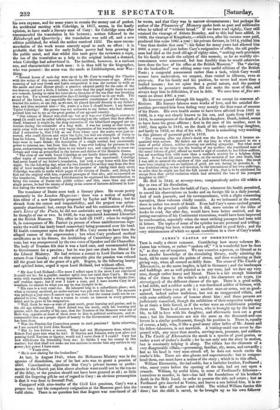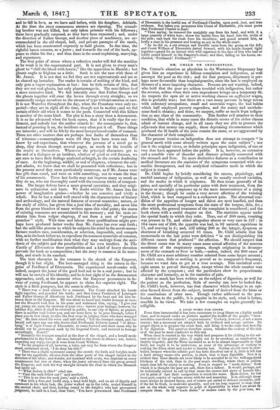JAMES'S CASTLE OF EHRENSTEIN.
THIS is really a clever romance. Considering how many volumes Mr. James has written, or rather "spoken off," "it is wonderful how he does it," as they say of conjurers. We can conceive a person, so blessed as to have slender knowledge of the circulating library, really admiring the book, till he came upon the points of stress, and then wondering at their giving way, when all seemed so deftly done. The scene of The Castle of Ehrenstein, as the name implies, is laid in Germany ; and the landscapes and buildings are as well painted as in any tour, and we dare say very true, though rather heavy and literal. There is a fair enough historical idea of the times in the writer's mind ; his characters are types, (or stereotypes) of the different classes of the age. There is a good noble, a bad noble, and a robber noble ; a war-hardened soldier of fortune, with a good heart when you get at it ; another man-at-arms, not so good- natured, indeed rather malicious, but not an exaggerated villain, and with some soldierly sense of honour about him : and these persons are judiciously conceived, though the exhibition of their respective traits may be at times a little forced, as if the writer were an exhibitionist pointing them out. There is of course a lover, who is brought up by the bad no- ble, to fall in love with his daughter, and afterwards turn out a great man ; but his lineaments are not the same as the thousand-and-one lovers in a similar predicament, though his position is. There is, equally of course, a lady, who, if like a good many other ladies of Mr. James and his fellow-labourers, is not mawkish. A waiting-maid can never be dis- pensed with, any more than monks, serving-men, peasants, and soldiers. In The Castle of Ehrenstein the monk is a species of good genius, or rather a sort of author's double ; for he not only sets the story in motion, but is constantly helping it along. The villain has the elements of a very disagreeable villain,—presaming, familiar, sly, mean, and cowardly ; but as his head is very soon struck off, he does not much excite the reader's bile. There are also ghosts and supematurals : but to compre- hend them, one must have a notion of the story ; which is to this effect.
William Ehrenstein, the bad noble, has a bachelor brother, Ferdinand ; who, many years before the opening of the tale, had set out upon a crusade. William, by artful hints, to some of Ferdinand's followers— incentives to murder, in fact—has laid the foundations of his brother's
death in the Holy Land, in order to possess the title and estate ; but as Ferdinand gets married at Venice, and leaves a son behind him, it is ne- cessary to take off mother and child. The wicked William fancies this done ; but the child is saved, to 'he brought up as his own follower
and to fall in love, as we have said before, with his daughter, Adelaide. At the time the story commences matters are ripening. The crusad- ing brother was not killed, but only taken prisoner with his followers ; these have gradually returned, as they have been ransomed ; and, under the direction of Father George, and another piece of machinery, are ac- commodated in the old chapel, hall, and private passages of the castle, which has been constructed expressly to hold ghosts. In due time, the rightful baron returns, as a jester ; and towards the end of the book, ap- pears to claim his due ; and then there is the usual explaining, marrying, and repentance.
The first point of stress where a reflective reader will feel the machine to be weak is in the supernatural part. It is not given to every man's ghost to "chill the blood with horror," like the apparition in Hamlet ; but ghosts ought to frighten us a little. Such is not the case with those of Mr. James. It is not that we feel they are not supernaturals and are to be cleared up hereafter. The reader is certain of nothing of the kind, and only gets a vague explanation at last : but he feels certain of this, that they are not real ghosts, but only phantasmagoria. The next failure is of
a more extensive kind. We feel tolerably sure that Father George and the ghosts together will steer the lovers through every straight; so we contentedly resign ourselves to the stream of type without emotion or care. It is not Waterloo throughout the day, when the Prussians were only ex- pected—they are in sight all the time, though not in motion ; and we feel certain of their aid when it comes to the push. Connected with this failure is another of the same kind. The plot is less a story than a denouement. It is so far advanced when the book opens, that it is really ripe for set- tlement, and nobody but the author retards it : the consequence is, that, instead of pressing it on, the incidents very often put it off. These things are inherent ; and will be felt by the most inexperienced reader of romance.
There are other matters that are perhaps less faults of themselves than of triteness—commonplaces worn till they have been worn out. We
know by sad experience, that whenever the persons of a novel go to sleep, they dream through several pages, as much to the trouble of the reader as themselves. Whenever the principal characters get to the end of a dialogue or an incident, whether of good or evil fortune, we are sure to have their feelings analyzed at length, to the certain deadening of ours. At the beginning, middle, or end of chapters, whenever the sub- ject admits, we know that we shall be presented with reflections ; but in the present novel they seem particularly numerous, as if Mr. James were less glib than usual, and went on with something, not to waste the time of his amanuensis. These last faults may not impress many so much as they do us, who are thoroughly sated with the common tricks of composi- tion. The larger defects have a more general operation; and they origi- nate in exhaustion and haste. We doubt whether Mr. James has the power of imaginative genius—whether he can conceive and vivify a whole. But he has a mind well stored with the characteristics of history and archmology, and the natural features of several countries ; nature, or the study of ethics, has given him a just idea of morality, and saves him from the gross blunders of many writers upon this vital point; the stores of existing romances are accumulated in his memory ; and his taste re- strains him from vulgar claptrap, if not from a sort of " preachee preachee " style. With time and labour these qualifications might per- haps have produced better works than Mr. James has ever sent forth ; but the mill-like process to which he subjects his mind in the novel-manu- facture renders care, consideration, or selection, impossible, and compels him, as in the book before us, to reproduce the common materials of romance, with no further modification than what they may undergo from the acci- dents of the subject and the peculiarities of his own intellect. In The Castle of Ehrenstein these peculiarities and a kind of heavy elevation pervade the book as a composition ; but the story is common in its mate- rials, and crude in its conduct.
The best character in the romance is the sketch of the Emperor, though it is but slight. The best-managed thing is the return in dis- guise of Ferdinand of Ehrenstein. The experienced novel-reader will, indeed, suspect the jester of the good lord not to be a real jester; but he will not be certain of his identity, and he is lost sight of as the denouement approaches, until, at the moment when the Emperor pronounces in fa- vour of young Ferdinand, he appears to claim his superior right. The style is a little pompous, but the scene is effective.
" There was a dead silence for a moment. The Count clenched his hands tight together, and gnashed his teeth; and then Count Frederick of Leiningen and Father George of Altenburg took Ferdinand by the hand and led him be- tween them to the Emperor. He was about to kneel and tender homage at once; but the Monarch took him in his arms and embraced him, saying, I give you joy, young sir, upon the recovery of your own: reserve your homage, however, for another day, when it shall be received in public, in our city of Spires; at present, there is another task before you, and one more form to be gone through, before I place you in that chair, to take the first steps in judging those who have wronged you He then raised his voice and said aloud, Let the trumpet sound, and the herald call upon any one who deities that Ferdinand, hitherto named " of Alten- burg," is of right Count of Ehrenstein, to come forward and show cause why he should not be pronounced such by the Imperial Court, and received to homage accordingly. Sound !'
" Instantly the trumpet sounded at the door of the chapel, and a herald made proclamation in due form. All men listened to the words in silence; not, indeed, were " Totesrpriseo,however, a voice, not very far from where the Emperor stood, exclaimed aloud, ' I do deny his title!' " There was a slight movement among the crowd; the lords and knights made way for the appellant; all eyes from the other parts of the chapel turned in the direction of the altar; and wonder, not unmixed with scorn, was depicted on every countenance but two or three, when the jester advanced from the group around the Emperor, and took his way straight towards the chair in which the Monarch had lately sat. " What foolery is this?' cried one. "'Cast the mad fellow out !' said another.
" This is no time for such jests,' said a third. "But with a firm and lordly step, a head held high, and an air of dignity and
command in his whole look, the jester walked up to the table, seated himself in the central chair, and then, looking round to the knights who had pronounced judgment, he said in a loud, clear voice, ' You have pronounced that Ferdinand of Ehrenstein is the lawful son of Ferdinand Charles, upon good, just, and true evidence. But before you pronounce him Count of Ehrenstem, you mast prove that Ferdinand Charles is dead.'
"Thus saying, he removed the unsightly cap from his head, and with it a large quantity of white hair; threw the bauble from his hand into the midst of the aisle; cast back the cloak from his shoulders; and gazed around him, as lordly a man in his presence and bearing as any in the whole court. "As he did so, acry strange and horrible came from the group on the left; and Count William of Ehrenstein darted forward, with his hands clasped tight together—gazed for an instant with wild eagerness in the face of him who had SG boldly seated himself in the Emperor's chair; and then, falling on his knees, ex- claimed, 'Ferdinand! Ferdinand!' "



























 Previous page
Previous page